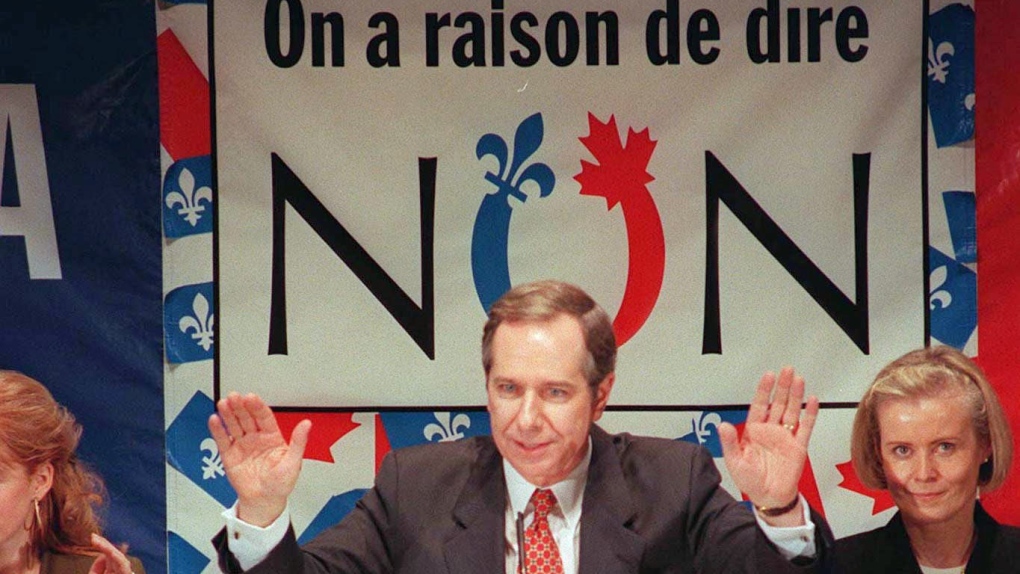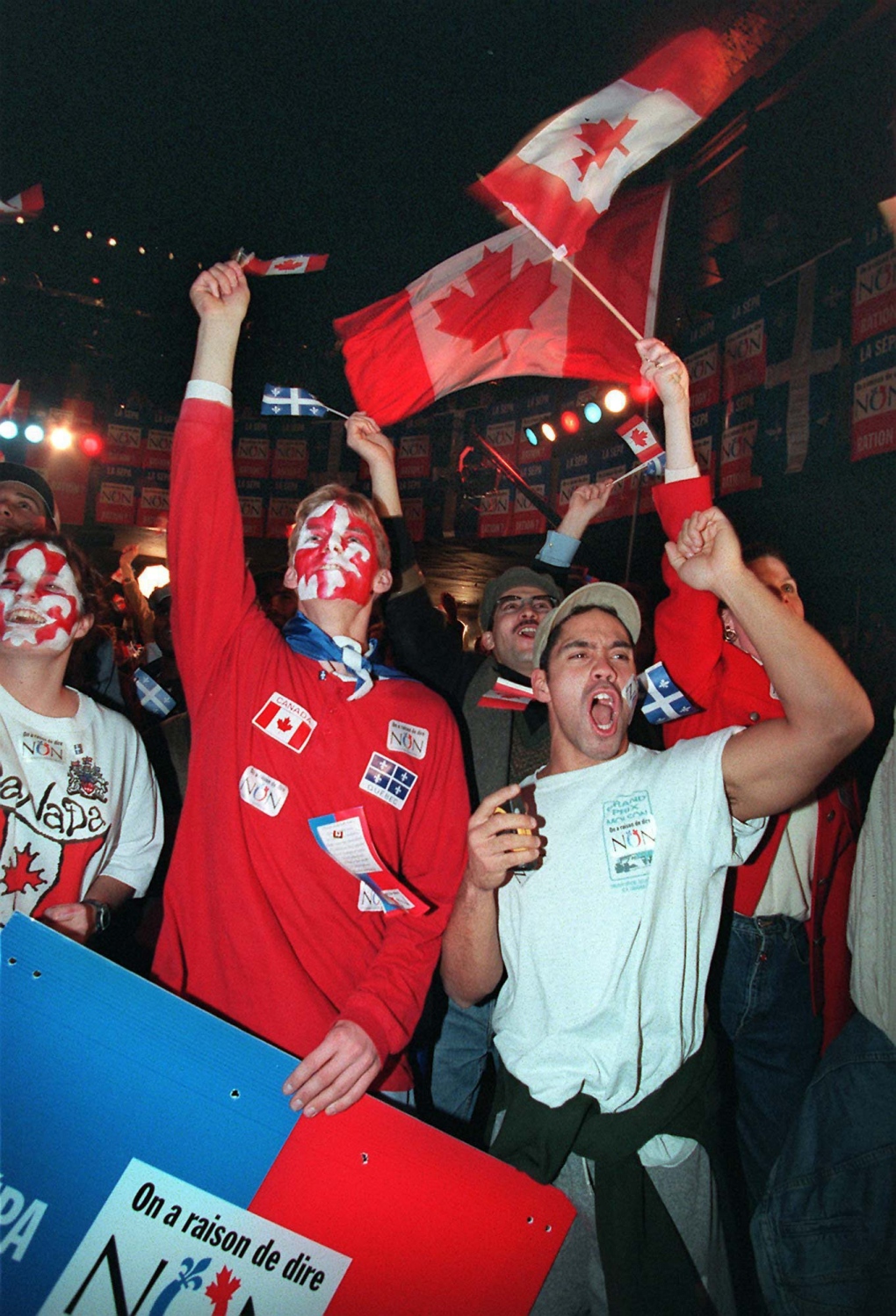Elections Quebec to respond to 'No' campaign financing in 1995 referendum
 SAYING NO--Daniel Johnson Quebec Liberal Leader and leader of the No campaign in the Quebec referendum delivers his victory speech after the No side won by a slim margin in Montreal, Monday.(CP {PHOTO)1995
SAYING NO--Daniel Johnson Quebec Liberal Leader and leader of the No campaign in the Quebec referendum delivers his victory speech after the No side won by a slim margin in Montreal, Monday.(CP {PHOTO)1995
Elections Quebec intends to respond next week to the national assembly's request to lift the secrecy surrounding the illegal financing of the "No" camp in the 1995 sovereignty referendum on.
The Parti Québécois (PQ) had a unanimous motion adopted by the legislature last week to lift the publication ban on testimony and documents gathered during the investigation, which dates back to 2007.
According to leader Paul St-Pierre Plamondon, the public needs to know the truth about what happened during the referendum, in which the No side won by a narrow margin of 50.58 to 49.42 per cent.
Sovereigntists have often accused their opponents of cheating during the referendum campaign by not respecting the funding ceiling allocated to both camps under Quebec law.
The PQ asked in a letter on Wednesday when and how the Chief Electoral Officer intends to proceed with the disclosure of documents.
In an e-mail sent to The Canadian Press on Thursday, Élections Québec stated that it "does not have an answer" to our questions about the timetable and procedure that will be adopted.
But the agency said it hopes to "formulate a response to the national assembly by the end of the parliamentary session," in other words, by the end of next week.
The motion asks the Chief Electoral Officer to "disclose the Grenier Commission documents as soon as possible."
In an e-mail sent last week, Elections Quebec stated that it was taking note of the motion adopted and that "we are currently evaluating the applicable legal framework."
When asked to clarify, the organization did not wish to give any explanation of this assessment.
The commission chaired by Bernard Grenier was tasked with investigating allegations of illegal financing of the "No" camp. The commission submitted its report in 2007.
No fewer than 90 witnesses were heard on camera and 4,500 documents were submitted as evidence. But all of this was subject to a "non-disclosure, and non-dissemination of evidence order," with no time limit, issued by Grenier.
Grenier justified his order by saying that he was "sensitive to the warning expressed by some as to the risk of damaging after 11 or 12 years the reputation of people who have a heart for the No cause in good faith."
He also stated that he could see it as difficult to make the documents accessible at the time.
"The prejudice and injustice that we would have wished to avoid by proceeding in camera would thus be caused," he said.
 No supporters celebrate at their campaign headquarters in Montreal Monday night as they watch the referendum results roll in. (CP PHOTO) 1995 (stf-Fred Chartrand)
No supporters celebrate at their campaign headquarters in Montreal Monday night as they watch the referendum results roll in. (CP PHOTO) 1995 (stf-Fred Chartrand)
REPORT'S CONCLUSIONS
Grenier concluded that the "controversial funds" came from the Department of Canadian Heritage.
He also concluded that the Canadian Unity Council (CUC) and Option Canada had spent more than $11 million between 1994 and 1996 to promote the "No" vote in a period extending well before and after the regulated spending period, i.e. the 1995 referendum campaign.
The expenses were "not tainted by any irregularity in relation to the requirements of the law," it said. "During the referendum campaign, the No camp had respected the ceiling of nearly $5.1 million."
 FILE - In this Friday, Oct. 27, 1995 file picture, a large Canadian flag is passed through a crowd in as thousands streamed into Montreal from all over Canada to join Quebecers rallying for national unity three days before a referendum that could propel Quebec toward secession. In Canada's May 2, 2011 federal election, voters dealt Quebec's separatists their worst humiliation in modern memory and set off a debate about whether the mostly French-speaking province even needs a separatist movement in this globalized age. (AP Photo/The Canadian Press, Ryan Remiorz)
FILE - In this Friday, Oct. 27, 1995 file picture, a large Canadian flag is passed through a crowd in as thousands streamed into Montreal from all over Canada to join Quebecers rallying for national unity three days before a referendum that could propel Quebec toward secession. In Canada's May 2, 2011 federal election, voters dealt Quebec's separatists their worst humiliation in modern memory and set off a debate about whether the mostly French-speaking province even needs a separatist movement in this globalized age. (AP Photo/The Canadian Press, Ryan Remiorz)
However, it was unable to determine who had financed the huge last-chance rally for Canada in Montreal at the end of the campaign, known as the "love-in" on Oct. 27, 1995.
"The evidence before me did not make it possible to determine the source of the funding for the October 27 rally in downtown Montreal," he wrote. "I am unable to conclude that the subsidies paid to the CUC or Option Canada were used to cover all or part of the costs of this rally."
This report by The Canadian Press was first published in French on June 1, 2023.
CTVNews.ca Top Stories

BREAKING Real GDP per capita declines for 6th consecutive quarter, household savings rise
Statistics Canada says the economy grew at an annualized pace of one per cent during the third quarter, in line with economists' expectations.
W5 Investigates A 'ticking time bomb': Inside Syria's toughest prison holding accused high-ranking ISIS members
In the last of a three-part investigation, W5's Avery Haines was given rare access to a Syrian prison, where thousands of accused high-ranking ISIS members are being held.
Class-action lawsuit on 'opioid-related wrongs': Court to rule on drug companies' appeal
Canada's top court will rule Friday on the appeal of a class-action lawsuit meant to recoup some of the costs associated with British Columbia's opioid crisis from major drug makers and distributors.
As Australia bans social media for children, Quebec is paying close attention
As Australia moves to ban social media for children under 16, Quebec is debating whether to follow suit.
Irregular sleep patterns may raise risk of heart attack and stroke, study suggests
Sleeping and waking up at different times is associated with an increased risk of heart attack and stroke, even for people who get the recommended amount of sleep, according to new research.
California man who went missing for 25 years found after sister sees his picture in the news
It’s a Thanksgiving miracle for one California family after a man who went missing in 1999 was found 25 years later when his sister saw a photo of him in an online article, authorities said.
Trudeau Liberals' two-month GST holiday bill passes the House, off to the Senate
The federal government's five-page piece of legislation to enact Prime Minister Justin Trudeau's promised two-month tax break on a range of consumer goods over the holidays passed in the House of Commons late Thursday.
Nick Cannon says he's seeking help for narcissistic personality disorder
Nick Cannon has spoken out about his recent diagnosis of narcissistic personality disorder, saying 'I need help.'
Notre Dame Cathedral: Sneak peek ahead of the reopening
After more than five years of frenetic reconstruction work, Notre Dame Cathedral showed its new self to the world Friday, with rebuilt soaring ceilings and creamy good-as-new stonework erasing somber memories of its devastating fire in 2019.


































